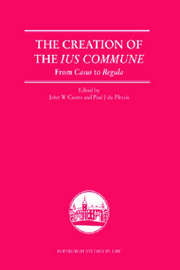Book contents
- Frontmatter
- Contents
- Preface
- List of Contributors
- List of Abbreviations
- Introduction
- 1 The Sources of Medieval Learned Law
- 2 The Infrastructure of the Early Ius Commune: The Formation of Regulae, or its Failure
- 3 Ius Quaerens Intellectum: The Method of the Medieval Civilians
- 4 Medieval Family and Marriage Law: From Actions of Status to Legal Doctrine
- 5 The Roman Concept of Ownership and the Medieval Doctrine of Dominium Utile
- 6 Succession to Fiefs: A Ius Commune Feudorum?
- 7 Towards the Medieval Law of Hypothec
- 8 The Ignorant Seller's Liability for Latent Defects: One Regula or Various Sets of Rules?
- 9 The Glossators' Monetary Law
- 10 Citations and the Construction of Procedural Law in the Ius Commune
- 11 Doctoribus bona dona danda sunt: Actions to Recover Unpaid Legal Fees
- Index
4 - Medieval Family and Marriage Law: From Actions of Status to Legal Doctrine
Published online by Cambridge University Press: 12 September 2012
- Frontmatter
- Contents
- Preface
- List of Contributors
- List of Abbreviations
- Introduction
- 1 The Sources of Medieval Learned Law
- 2 The Infrastructure of the Early Ius Commune: The Formation of Regulae, or its Failure
- 3 Ius Quaerens Intellectum: The Method of the Medieval Civilians
- 4 Medieval Family and Marriage Law: From Actions of Status to Legal Doctrine
- 5 The Roman Concept of Ownership and the Medieval Doctrine of Dominium Utile
- 6 Succession to Fiefs: A Ius Commune Feudorum?
- 7 Towards the Medieval Law of Hypothec
- 8 The Ignorant Seller's Liability for Latent Defects: One Regula or Various Sets of Rules?
- 9 The Glossators' Monetary Law
- 10 Citations and the Construction of Procedural Law in the Ius Commune
- 11 Doctoribus bona dona danda sunt: Actions to Recover Unpaid Legal Fees
- Index
Summary
INTRODUCTION
The theme “from casus to regula” is particularly interesting in the law of persons. The sources of classical Roman law contain only case law (casus) about family matters and personal relations between house-mates and relatives. There were no rules (regulae). The way in which, at the end of the twelfth century, this case law was shaped into rules and systematic doctrine is significant for the history of medieval law.
THE ROMAN LAW OF PERSONS
In classical Latin a persona was a theatre mask, hence a character and a theatre player. In legal texts the word was used for the actors in a law suit. When the word occurs in the Corpus iuris civilis, it has thus to be understood as referring to one of the men present in court. It is accordingly found used for a plaintiff or pursuer, for a defender or defendant, and for the judge. An action in personam was not understood as an action against a person, but as an action against the defendant whose name was mentioned in its formula.
Gaius commenced his Institutes with the law of persons. In the first part of his book he described the situation of men in court. His reflections on slaves and family members are related to their representation in court. It is impossible to understand the first part of his Institutes without realising that the contents are about civil courts. Contemporary Romanists have to fight the tendency to find in Gaius rules of modern-time civil institutions. The example of tutela illustrates this well.
- Type
- Chapter
- Information
- The Creation of the Ius CommuneFrom Casus to Regula, pp. 103 - 126Publisher: Edinburgh University PressPrint publication year: 2010



